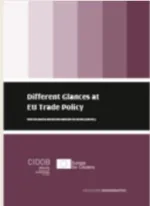EU trade policy and developing countries: towards a more ethical agenda?

This chapter aims to provide a concise overview of evolutions in European Union (EU) trade policy towards developing countries. In line with the general purpose of this volume, it also considers the importance of Commissioner Cecilia Malmström’s Trade for All (2015) strategy in this regard. Ever since the early years of European integration, an ethical agenda towards the Global South has been proclaimed. The Schuman Declaration of May 9th 1950 declared “the development of the African continent” to be “one of its [Europe’s] essential tasks” and part four of the Treaty of Rome of 1957 was dedicated to privileged trade and aid relations with “the Overseas Countries and Territories”. Subsequent the Yaoundé (1963, 1969) and Lomé conventions (1975, 1980, 1985, 1990) and the Cotonou (2000) Agreement continued the special trade-and-aid relationship with member states’ former colonies assembled in the African, Caribbean and Pacific (ACP) group, larded with an ethical development discourse. Since the 1960s and 1970s, Europe has also established preferential trade agreements with countries in eastern Europe and in the southern Mediterranean. In a practical application of wider calls by developing countries for a New International Economic Order (NIEO), the European Community was the first to create a Generalised System of Preferences (GSP) in 1971, thereby enhancing Asian and Latin American countries’ access to its market. Throughout the 1990s and 2000s, the EU’s growing market size and political profile further substantiated the conception of its role as a leading and “normative” power. This resulted in a number of highly symbolic trade-related initiatives towards the developing world: the “Everything but Arms” (EBA) initiatives providing duty-free and quota-free access for the least-developed countries (LDCs) (2001), the calls led by the EU for a Development Round of the World Trade Organization (WTO) in the lead-up to Doha Conference (2001), the elaboration of the GSP+ system with sustainable development and governance trade conditionality (2005), and the EU Aid for Trade Strategy (2007) all seemed to underpin this image of an ethical actor towards the Global South. One decade later, however, it remains unclear how successful the EU has been. A number of internal and international evolutions have challenged both the EU’s “normative” and “power” profiles.